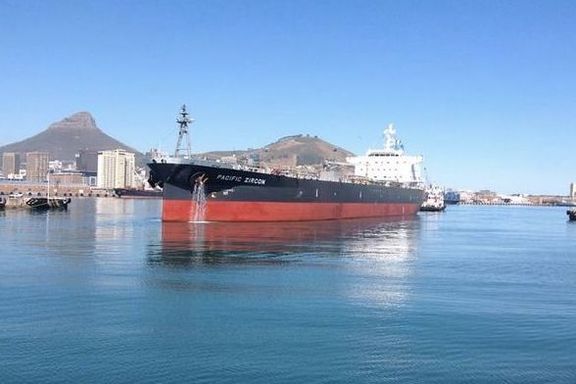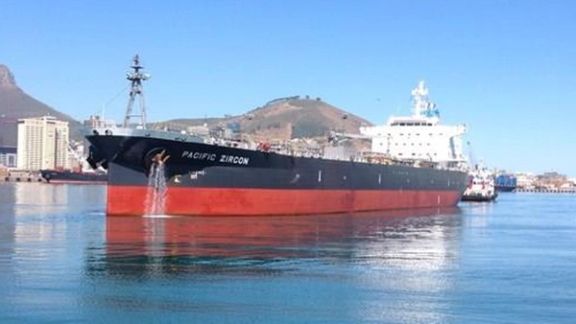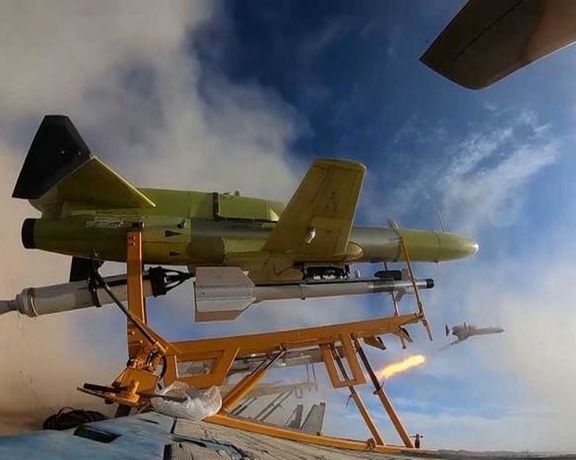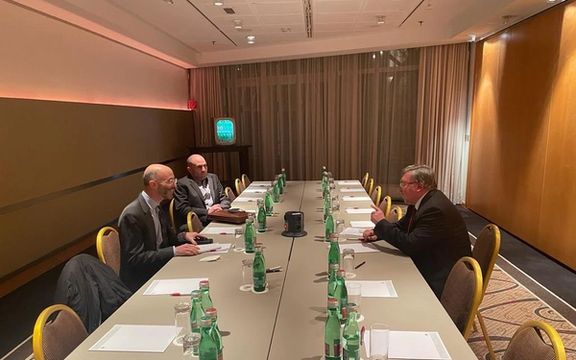US Centcom Says Iranian Drone Hit Pacific Zircon Tanker Off Oman

An attack on a tanker off the coast of Oman on Tuesday was carried out by an Iranian-made drone, US Central Command said in a statement on Wednesday.

An attack on a tanker off the coast of Oman on Tuesday was carried out by an Iranian-made drone, US Central Command said in a statement on Wednesday.
It added that a multilateral maritime operation led by a British Royal Navy frigate had responded to the area.
An Israeli official had blamed Iran for the strike on the Pacific Zircon tanker managed by Israeli-controlled Eastern Pacific Shipping. The company said there was minor damage to the hull but no injuries or spillage of the gas oil cargo.
A White House official earlier said the United States was "confident that Iran likely conducted" the hit using an unmanned aerial vehicle. Iran's Nournews, which is affiliated with the country's top security body, blamed Israel for the attack.
US Central Command said in a statement that debris "reveals that it was a Shahed-series one-way attack drone" that hit the vessel, identifying it as Iranian-made.
"This unmanned aerial vehicle attack against a civilian vessel in this critical maritime strait demonstrates, once again, the destabilizing nature of Iranian malign activity in the region," the Central Command statement said.
It said a multilateral operation responded to the scene led by the British Royal Navy's HMS Lancaster. US Navy guided-missile destroyer USS The Sullivans and a US Navy patrol coastal ship and patrol craft were involved in the operation.
Attacks on tankers in Gulf waters in recent years have come at times of heightened regional tensions with Iran.
In July 2021, a suspected drone attack off Oman's coast hit a petroleum product tanker managed by an Israeli firm. Iran denied the accusations that it was responsible.

Britain’s MI5 has said Iran poses a major security threat for the United Kingdom as it uses “coercion, intimidation, and violence to pursue its interests.
MI5 Director General, Ken McCallum said Wednesday that except Russia and China, the Islamic Republic is a “mounting concern.”
During his annual threat update in Thames House, London, he underlined that Iran is a state actor which most frequently crosses into terrorism.
“Iran projects threat to the UK directly, through its aggressive intelligence services. At its sharpest this includes ambitions to kidnap or even kill British or UK-based individuals perceived as enemies of the regime,” added McCallum.
He went on to say that UK authorities have discovered at least 10 “potential threats” since January to “kidnap or even kill British or UK-based individuals perceived as enemies of the regime.”
Some UK politicians have demanded a tougher stance toward the clerical government in Tehran.
Elsewhere in his remarks, McCallum noted that “We work at pace with domestic and international partners to disrupt this completely unacceptable activity. The Foreign Secretary made clear to the Iranian regime just last week that the UK will not tolerate intimidation or threats to life towards journalists, or any individual, living in the UK.”
The UK summoned Iran’s ambassador last week as the regime is accused of threatening journalists working in Britain. The UK-based Iran International TV network said last week that two of its journalists had recently been notified of the threats.
In a statement Volant Media, the parent company of Iran International, said “The Metropolitan Police have now formally notified both journalists that these threats represent an imminent, credible and significant risk to their lives and those of their families. Other members of our staff have also been informed directly by the Metropolitan Police of separate threats.”
Speaking about the recent protests in Iran, UK’s top domestic security chief stated the regime is resorting to violence to silence critics who are asking fundamental questions of the totalitarian regime. However, he raised hope that this could “signal profound change, but the trajectory is uncertain.”
The current protests in Iran, which started in mid-September after Mahsa Amini, a young woman was killed in the custody of ‘morality police’, have lasted nearly two months, the longest and most serious challenge to the Islamic Republic, which has one of the largest trained and well-equipped suppression machines in the world.
So far, security forces have killed more than 340 protesters, according to human rights monitors and arrested an estimated 14,000 people. Just during protests on Wednesday around 10 protesters and bystanders were killed.
During his Wednesday comments, McCallum also blamed Iran as a regime that with its proxies, remains a profoundly destabilizing actor in its region and beyond, adding that the Islamic Republic provides support to Russia, including by supplying the drones inflicting misery in Ukraine.

The US Navy's Fifth Fleet says a commercial vessel has been struck off the Gulf of Oman, while reports indicate the vessel’s owner is an Israeli.
The Associated Press cited a defense official as saying that a Liberian-flagged oil tanker was hit and exploded in a drone attack Tuesday night.
Commander Timothy Hawkins said Wednesday the tanker was operated by the Singapore-based Eastern Pacific Shipping, a company AP said was ultimately owned by Israeli billionaire Idan Ofer.
The shipping firm says the attack dealt minor damage to the tanker, causing no injuries or spillage.
According to shipping tracking site MarineTraffic, the tanker, Pacific Zircon, was last seen off the coast of Liwa, Oman on Monday morning. It departed from Sohar, Oman Monday afternoon with its destination set as the port of Buenos Aires, Argentina.
While no one immediately claimed responsibility for the attack, suspicion immediately fell on Iran.
Tehran and Israel have been engaged in a yearslong shadow war in the wider Middle East, with some drone attacks targeting Israeli-associated vessels traveling around the region.
Last July, Iran targeted the Mercer Street oil tanker with drones. One drone slammed into the bridge of the ship, killing two members of the crew.
Mercer Street was operated by London-based Zodiac Maritime, part of Israeli Zodiac Group owned by Eyal Ofer.
In the spring of 2021, there were also several incidents involving attacks on ships, including the Helios Ray in February and the Hyperion Ray in April.

Georgia’s security officials said Tuesday they have foiled an Iranian plot to assassinate an Israeli citizen on their soil.
The murder had been planned by Iran’s Revolutionary Guard Quds Force which conducts overseas operations of the IRGC.
The plan was to kill Itzik Moshe, a businessman who worked to advance Israel-Georgia ties.
The State Security Service of Georgia released a statement on Tuesday saying the man planning the attack has been arrested, and the one who apparently ordered the murder is identified as an Iranian national working outside Georgia.
The security agency also said several people were arrested in the course of the investigation, including Georgians who held dual citizenship with Iran or Pakistan.
Dual Iranian-Georgian citizens residing in Georgia delivered weapons to a Pakistani hit man without meeting him directly; rather, they used hiding places for the weapon transfer, added the statement.
The news from Georgia came months after Israeli and Turkish intelligence agencies worked together to stop an Iranian plot to assassinate Israeli tourists in Istanbul. Jerusalem warned Israelis not to visit Turkey in June, and soon after, Turkey arrested eight members of an Iranian cell in hotel rooms in a popular tourist district, with weapons and ammunition.
Last October, Cyprus foiled an Iranian plot to attack Israelis, including billionaire Teddy Sagi, which Tehran denied. Cypriot authorities arrested a Russian-Azeri man who had a loaded pistol with a silencer in his rented car.

Washington Tuesday imposed sanctions on companies and people it accused of being involved in the production or transfer of Iranian drones that have been used by Russia in attacks on civilian infrastructure in Ukraine.
Russia has procured drones from Iran that have been used to attack cities and power infrastructure in Ukraine.
Iran has acknowledged that it had supplied Moscow with drones but said they were sent before the war in Ukraine.
"As we have demonstrated repeatedly, the United States is determined to sanction people and companies, no matter where they are located, that support Russia's unjustified invasion of Ukraine," Treasury Secretary Janet Yellen said in the statement.
"Today's action exposes and holds accountable companies and individuals that have enabled Russia's use of Iranian-built UAVs to brutalize Ukrainian civilians," she said.
The US Treasury Department, in a statement, said it imposed sanctions on the Shahed Aviation Industries Research Center, which it said was subordinate to Iran's Revolutionary Guard Corps (IRGC) Aerospace Force, accusing the firm of being responsible for the design and production of Shahed-series drones being used by Russian forces in Ukraine.
Also designated were United Arab Emirates air transportation firms Success Aviation Services FZC and iJet Global DMCC, which the Treasury accused of collaborating with an Iranian firm under US sanctions to coordinate flights between Iran and Russia, including those tied to transporting Iranian drones.
Treasury said the action against the two companies was taken in cooperation with the government of the United Arab Emirates.
Tuesday's move freezes any US assets of those designated and generally bars Americans from dealing with them.
Reuters report

Remarks from United States special Iran envoy Rob Malley Monday signaled Washington no longer sees Iran’s nuclear program as separable from other issues.
Speaking to reporters in Paris, Malley appeared to jettison the logic of the 2015 Iran nuclear agreement, which restricted Tehran’s atomic program in return for the easing of international sanctions. Eighteen-month talks to revive the agreement, from which former president Trump withdrew the US in 2018, have come to naught.
“Our focus is not an accord that isn’t moving forward, but what is happening in Iran ... this popular movement and the brutal crackdown of the regime against protesters,” Malley said. “It’s the sale of armed drones by Iran to Russia ... and the liberation of our hostages…” At least three American nationals are detained in Iran, with talks for a prisoner swap inconclusive.
Malley reiterated Washington’s view that the talks to revive the 2015 agreement, the JCPOA (Joint Comprehensive Plan of Action), had floundered because of both “Iran’s position,” in making demands the US considers beyond the JCPOA, and “everything that has happened since [September].” Recent protests in Iran followed the September 16 death of Mahsa Amini after detention by Tehran ‘morality police.’
President Joe Biden came to office in 2021 committed to reviving the JCPOA as a non-proliferation agreement and thereby lifting the ‘maximum pressure’ sanctions introduced by Trump. But Biden’s administration has extended sanctions, citing both Tehran’s military links with Russia and its treatment of protestors.

Since 2019, the year after the US left the JCPOA, Iran has in response gradually extended its nuclear program and according to the latest report from the International Atomic Energy Agency (IAEA) has now 3,674kg of enriched uranium. This is far above the 267kg JCPOA limit, and includes 62kg enriched to 60 percent, a short step from the 90 percent considered ‘weapons grade.’
Under the JCPOA Iran enriched only to 3.67 percent. Under the JCPOA it employed only 6,104 first-generation centrifuges whereas it now additionally uses at least 4,000 more advanced centrifuges that were banned under the 2015 agreement.
‘No magic…new formula’
Malley said Monday the US would discuss with its “European allies” what steps to take should Iran continue to expand nuclear activities. “If Iran takes the initiative to cross new thresholds in its nuclear program, then obviously the response will be different and coordinated with our European allies…There is no magic in which we will find a new formula.”
With Benjamin Netanyahu set to return to office and the outgoing Israeli administration suggesting it had thoroughly prepared for a military attack on Iran, both the United Arab Emirates (UAE) and Saudi Arabia show concern over rising tensions. While Central Intelligence Agency director William Burns Monday met the head of Russian foreign intelligence Sergey Naryshkin in Ankara to discuss ‘risk management,’ there has been speculation that Moscow has decided to supply Iran with Su-35 fighter jets.
Anwar Gargash, diplomatic adviser to UAE President Mohamed bin Zayed Al Nahyan, said Monday the Emirates had no interest in “choosing sides” between competing powers. Gargash said that while the UAE wanted “codified and unambivalent commitments” from the US, it hoped to see effort put into easing strains and encouraging economic growth without relying on “just one or two countries.”
Both the UAE and Saudi Arabia are expanding trade with China, while Riyadh has led coordination through Opec+ with Russia over oil production levels. The UAE has stepped back from involvement in violent conflict in Yemen and Libya, and earlier this year restored full diplomatic relations with Iran after a six-year gap. While the UAE in 2020 ‘normalized’ relations with Israel, Saudi Arabia so far has maintained the Arab League position that this requires Israeli recognition of Palestinian statehood.